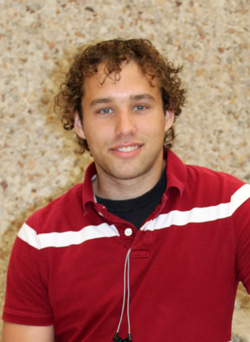
Corey Keith will be graduating with a Ph.D. in nuclear engineering in May. Keith worked with Dr. William Charlton on a project to investigate trace uranium-236 content variations in world-wide geologic uranium deposits.
Nuclear signatures, whether for forensics or safeguards applications, utilize two broad classes: comparative and predictive. While comparative methods analyze a sample against a database of previously measured samples, predictive signatures utilize the underlying physics of the system to draw conclusions about the origin of the sample. Keith’s work evaluates the potential use of uranium-236 variation in natural uranium as a predictive signature for uranium ore concentrate. The limitations and capabilities of using uranium-236 were investigated through measurement techniques, production modeling, and Bayesian analysis.
Keith received a B.S. in physics from University of Texas at El Paso in 2010. He went on to receive a M.S. in health physics from the University of Nevada, Las Vegas in 2012. He defended his dissertation in November of 2015.
For more information on Keith’s work, please visit his profile page.